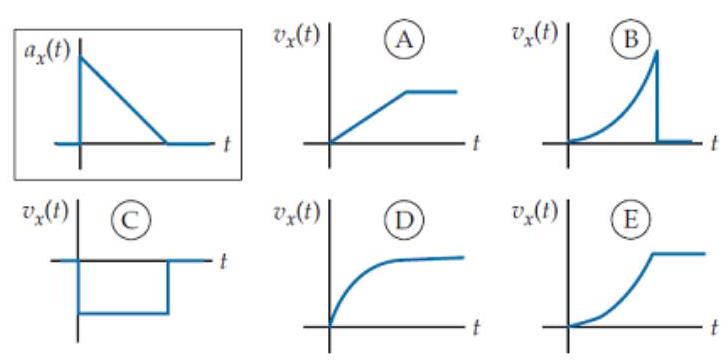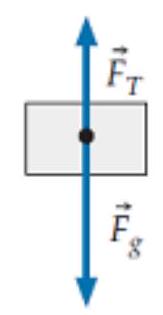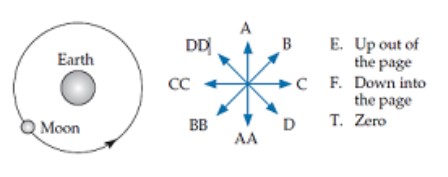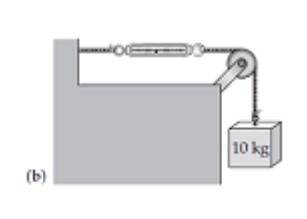Exam 2: The Laws of Physics Are Universal Newtonian Mechanics
Exam 1: Conservation Laws Constrain Interactions216 Questions
Exam 2: The Laws of Physics Are Universal Newtonian Mechanics147 Questions
Exam 3: The Laws of Physics Are Frame-Independent Relativity124 Questions
Exam 4: Electricity and Magnetism Are Unified333 Questions
Exam 5: Matter Behaves Like Waves Quantum Physics210 Questions
Exam 6: Some Processes Are Irreversible Thermal Physics151 Questions
Select questions type
When you go over the crest of a hill in a roller coaster, a force appears to lift you up out of your seat. This is a fictitious force.
(True/False)
4.9/5  (38)
(38)
An object's -acceleration is shown in the boxed graph at the top left. Which of the other graphs in the set most correctly describes its -velocity?

(Multiple Choice)
4.8/5  (40)
(40)
Suppose that a comet goes around the sun in an elliptical orbit such that the comet at the farthest point in its orbit is 3 times as far from the sun as it is when it is at its closest point. How many times stronger is the gravitational force on the comet due to the sun when it is at its closest point than when it is at its farthest?
(Multiple Choice)
4.8/5  (29)
(29)
The drawing shown is supposed to be a free-body diagram of a crate that is being lowered by a crane and is speeding up as it is being lowered. Is the diagram correct? (Ignore air resistance.)

(Multiple Choice)
4.8/5  (37)
(37)
The diagram below shows a top view of the moon's nearly circular orbit around the earth. The moon orbits the earth at a nearly constant speed.
 At the point shown, use the arrow choices shown to the right to indicate the direction of
-The gravitational force on the earth due to the moon. (To choose a double-letter answer using the letters on the back of the book, point with two fingers to the letter.)
At the point shown, use the arrow choices shown to the right to indicate the direction of
-The gravitational force on the earth due to the moon. (To choose a double-letter answer using the letters on the back of the book, point with two fingers to the letter.)
(Short Answer)
4.8/5  (38)
(38)
An object can have zero velocity (at an instant) and still be accelerating.
(True/False)
4.9/5  (32)
(32)
According to the text, an orbiting object having energy follows an elliptical orbit. When we specify the numerical value for an object's energy, we are implicitly comparing it to the energy the object has in some reference situation. So, when we say that in this case, we are comparing the energy of the orbiting object to the energy of an object with the same mass that is
(Multiple Choice)
4.9/5  (39)
(39)
Imagine you throw a tennis ball vertically into the air. At the exact top of its trajectory it is at rest. What is the magnitude of its acceleration at this point?
(Multiple Choice)
4.8/5  (27)
(27)
Suppose we know the value of for a simple harmonic oscillator. What further information do we need to know to fix the amplitude and the initial phase in the solution to the simple harmonic oscillator equation? (If more than one item is needed, feel free to indicate more than one answer.)
(Multiple Choice)
4.9/5  (34)
(34)
A spring scale typically indicates the magnitude of the tension force exerted on its bottom hook. What will the scale read in each of the cases shown in the diagram? (Hint: Draw a free-body diagram for the scale in each case.)
-
(Multiple Choice)
5.0/5  (43)
(43)
Do the following statements about the physical world express
-A heavy object falls faster than a light object.
A)a primarily Aristotelian viewpoint .
B)aprimarily Newtonian viewpoint.
C)are they consistent with both viewpoints
(Short Answer)
4.9/5  (38)
(38)
In the situation described in problem N12T.6, what do you think will happen to the satellite's speed as time passes?
(Multiple Choice)
5.0/5  (41)
(41)
Suppose an object is hanging from the end of a spring. Let the spring's length when the object is hanging at rest be L. Now suppose we pull the object downward until the spring has been stretched a length of . By what factor has the force that the spring is exerting on the object increased?
(Multiple Choice)
4.7/5  (39)
(39)
A glider on an air track is connected by a spring to the end of the air track. If it is pulled in the direction away from its equilibrium point and then released from rest at , what is the initial phase ?
(Multiple Choice)
4.8/5  (33)
(33)
Suppose you are preparing an actual-size trajectory diagram of a freely falling object. The time interval between positions is . How long should you draw the acceleration arrows on your diagram?
(Multiple Choice)
4.9/5  (45)
(45)
The coefficient of static friction between Teflon and scrambled eggs is about 0.1. What is the smallest tilt angle from the horizontal that will cause the eggs to slide across the surface of a tilted Teflon-coated pan?
(Multiple Choice)
4.8/5  (43)
(43)
A parent pushes a small child on a swing so that the child moves rapidly away while the parent remains at rest. How does the magnitude of the force that the child exerts on the parent compare to the magnitude of the force that the parent exerts on the child?
(Multiple Choice)
4.8/5  (41)
(41)
In a Western movie, a person shoots an arrow backward from a fleeing horse. If the velocity of the horse relative to the ground is west and the arrow's velocity relative to the horse is east, what is the arrow's velocity with respect to the ground?
(Multiple Choice)
4.9/5  (42)
(42)
Imagine that a certain engine can cause the road to exert a certain maximum forward force on a certain car. If we change the car's design to reduce its drag coefficient by a factor of 2 , by what factor will the car's maximum speed increase (other things being equal)?
(Multiple Choice)
4.8/5  (39)
(39)
Which of the following pairs of forces are third-law partners? Answer if the two forces described are third-law partners, if they are not.
-A motorboat propeller pushes backward on the water; the water pushes forward on the propeller.
(True/False)
4.8/5  (44)
(44)
Showing 101 - 120 of 147
Filters
- Essay(0)
- Multiple Choice(0)
- Short Answer(0)
- True False(0)
- Matching(0)